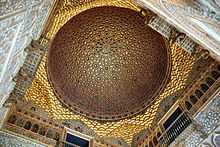Alcázar


An alcázar (Spanish: [alˈkaθar], Galician: [alˈkaθaɾ]), alcácer (Portuguese: [ɐɫˈkasɛɾ]) or alcàsser (Catalan: [əɫˈkasər]) is a type of castle in Spain and Portugal built by kings to live in. The term derives from the Arabic word القصر (trans. al-qasr) meaning "fort, castle or palace" while the Arabic word is possibly in turn derived from the Latin word 'castrum', meaning an army camp or fort. Many cities in Spain have an alcázar; Spain also has Moorish citadels known as alcazabas. However, not all castles in Spain are called alcázar: the majority are called castillo. Nor was every 'alcazar' or 'alcazaba' in Iberia built by the Moors: many castles with these names were built after the Moors had withdrawn from the Iberian Peninsula.
Landmark alcázares
- The Alcázar of Segovia was first cited in the 12th century, though it might date back to Roman times. During the Middle Ages when in the Kingdom of Castile, the alcázar of Segovia was the favorite residence of Castilian monarchs, and almost each king added new parts to the building, transforming the original fortress into a courtier residence and prolonging the construction of the castle until the 16th century, when king Philip II added the conical spires and the slate roofs. A fire in 1862 destroyed part of the roofs, but they were restored in the very same style in which they were built 300 years before. This Alcázar was also the place where in 1492 Ferdinand and Isabella signed the Jewish expulsion order from Spain.
- The Alcázar of Madrid was a palace built by Emperor Charles V (rebuilt by his son, Philip II)[1] and was the main royal residence in Madrid until the Buen Retiro Palace partly superseded it in the 17th century. It was destroyed by fire in 1734, and the present Royal Palace of Madrid was built on the site. This was called Palacio Nuevo and has never been called alcázar.
- The Alcázar of Toledo was used as a military academy in modern times. The "Siege of the Alcázar" in the Spanish Civil War refers to this castle, which was held by the Nationalist Colonel José Moscardó Ituarte against Republican forces. Republican forces captured Moscardó's 24-year-old son Luis, and on 23 July 1936 informed Moscardó that if he did not turn over the alcázar within ten minutes his son would die. When Moscardó did not surrender, Luis was murdered, not immediately but one month later, on 23 August.[2]
- The Alcázar of Seville, on the site of the Almohades palace called al-Muwarak, was built in the 1360s by Moorish craftsmen in Mudéjar style, and often remodeled. It was first used by Pedro of Castile with his mistress Maria de Padilla. The structures and gardens are a UNESCO World Heritage Site.
- Alcázar de los Reyes Cristianos, also called the Alcázar of Córdoba, in Córdoba, Spain was a Moorish palace after the 13th century Reconquista of Córdoba. The Moors had expanded a Visigoth fortress into a large compound with gardens and a large library. [3] This Alcázar was the summer home of King Ferdinand and Queen Isabella, and the site of their meeting with Christopher Columbus before his famous voyage to the Americas.
Outside Spain
Outside Spain, in Palermo, Sicily, the district called Cassaro corresponds to the Punic settlement of Zis, on high ground that was refortified by Arabs and called القصر al qasr, and was further expanded as the site of the later Norman palace.
In Portugal there is a city called Alcácer do Sal (Al Qaşr), which was an administrative regional seat for the Moors during the Islamic Al-Andalus era on the Iberian Peninsula.
The former colonial palace in Santo Domingo, originally built for Christopher Columbus's son Diego in 1509, is commonly known as the Alcázar de Colón (Columbus's Alcázar) and is built after the Andalusian style.
Notes
- ↑ Philip of Spain by Henry Kamen
- ↑ Hugh Thomas, The Spanish Civil War, revised and enlarged edition (1977), New York: Harper & Row. ISBN 0-06-014278-2. p. 324
- ↑ Reed, Tony (2005). "Alcazar de los Reyes Cristianos - Cordoba". Infocordoba.com. Archived from the original on 11 May 2006. Retrieved April 4, 2006.